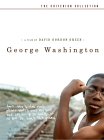| Reviews & Columns |
|
Reviews DVD TV on DVD Blu-ray 4K UHD International DVDs In Theaters Reviews by Studio Video Games Features Collector Series DVDs Easter Egg Database Interviews DVD Talk Radio Feature Articles Columns Anime Talk DVD Savant Horror DVDs The M.O.D. Squad Art House HD Talk Silent DVD
|
DVD Talk Forum |
|
|
| Resources |
|
DVD Price Search Customer Service #'s RCE Info Links |
|
Columns
|
|
|
George Washington - Criterion
WHAT'S IT ALL ABOUT?
Many critics have heaped praise on David Gordon Green's debut film George Washington, likening the film to the dubiously poetic work of Terrence Malick. And to be sure, you have to pause and appreciate the audacity of a filmmaker interested in simply letting characters lazily interact and philosophize in their environment. I admire any filmmaker who takes chances with the medium. But there's no getting around the fact that George Washington is something of a bore—a meandering yawnfest that yearns for depth of character and IMPORTANCE but is actually just a muddled and rather pointless exercise.
The plot's focus in on George (Donald Holden), a quiet, tender boy whose skull has never completely fused since birth. Nasia (Candace Evanofski) finds herself drawn to George, despite the presence of Buddy (Curtis Cotton), who yearns for Nasia the way only a preteen can. Nasia is one of those impossible kid characters that spouts adult wisdom straight from the writer's pen: "The grownups in our town were never kids like me and my friends. They had worked in wars and built machines. It was hard for them to find their peace."
The tragic event that jumpstarts these proceedings is a scene of disturbing power—I'll be the first to admit that—but then things start heading quickly south. Following what should be an event that tentpoles a potentially effective film, the story falls apart into ineffectual subplots like a broken string of fake pearls. Two characters—Vernon (Damien Jewan Lee) and Sonya (Rachael Handy)—keep trying to steal a car. A bunch of lazy construction workers provide limp comedic relief. George saves a boy from drowning at a swimming pool, despite the danger to his soft head, and fancies himself a superhero. And so on.
George Washington earnestly wants to be meaningful, and in trying so hard, it becomes meaningless. There are elements to admire about the film: As a deliberately impressionistic portrayal of working-class rural angst, George Washington paints a vivid setting. But like Malick's similarly tedious The Thin Red Line, this film has no real use for narrative. Which is fine—if you've found another way to communicate effectively in film. Unfortunately, Green's film has distressingly little to say. Green has been so heavily "inspired" by other films and filmmakers that he hasn't bothered to discover his own voice.
And let's be honest: That is one horrible title.
HOW'S IT LOOK?
Criterion presents George Washington in a nearly flawless anamorphic widescreen transfer of the film's original 2.35:1 theatrical aspect ratio. I was very impressed with the level of detail in this presentation and have no complaints about it—except for a few scenes that appear deliberately soft. The intentionally muted color palette is accurately rendered.
HOW'S IT SOUND?
The Dolby Digital 2.0 soundtrack is utilitarian. The film never asks much of its soundtrack, but Criterion's presentation is as accurate as you could ask for.
WHAT ELSE IS THERE?
The DVD's supplements are divided into three sections. The first section, Commentary, offers a scene-specific audio track from Green, cinematographer Tim Orr, and actor Paul Schnieder. The filmmakers offer interesting behind-the-scenes anecdotes and, significantly, have a lot to say about their influences, which include Malick and films such as Walkabout and Butch Cassidy. The track is a bit of a catch-22 in that it enhances your appreciation for the film's attention to environment but at the same time validates your suspicions that much of the film was improvised based on the whims of child actors.
This second section, Finding Clues, contains three short films that are inspirations for George Washington. Two of the films are student films from Green's days at the University of Northern Carolina. Pleasant Grove is a nicely preserved fullframe presentation and contains entire scenes and lines of dialog that you will see in the main feature. You can choose to watch the film with commentary by Green, Orr, and Schneider. Physical Pinball is more experimental stylistically, and the film elements are in worse shape, but it also contains obvious precursors to George Washington. The third film is from 1969, character actor Clu Gulager's practically silent short film A Day with the Boys. Green and Orr extensively studied its use of slow-motion and still photography while preparing George Washington, and the influences show.
The third section, Mysteries Made, contains a deleted scene (in which many of George Washington's characters assemble for a townhall meeting), a Cast Reunion featurette (in which Green interviews his actors two years after the making of the film), a Charlie Rose interview with Green (in which it is revealed yet again that Charlie Rose is possibly the most incompetent interviewer in the history of the television medium), and the film's anamorphic widescreen trailer.
WHAT'S LEFT TO SAY?
George Washington has its share of admirers. However, if you're not so easily swayed by pretension, you might want to look elsewhere.
|
| Popular Reviews |
| Sponsored Links |
|
|
| Sponsored Links |
|
|
| Release List | Reviews | Shop | Newsletter | Forum | DVD Giveaways | Blu-Ray | Advertise |
|
Copyright 2024 DVDTalk.com All Rights Reserved. Legal Info, Privacy Policy, Terms of Use,
Manage Preferences,
Your Privacy Choices | |||||||














